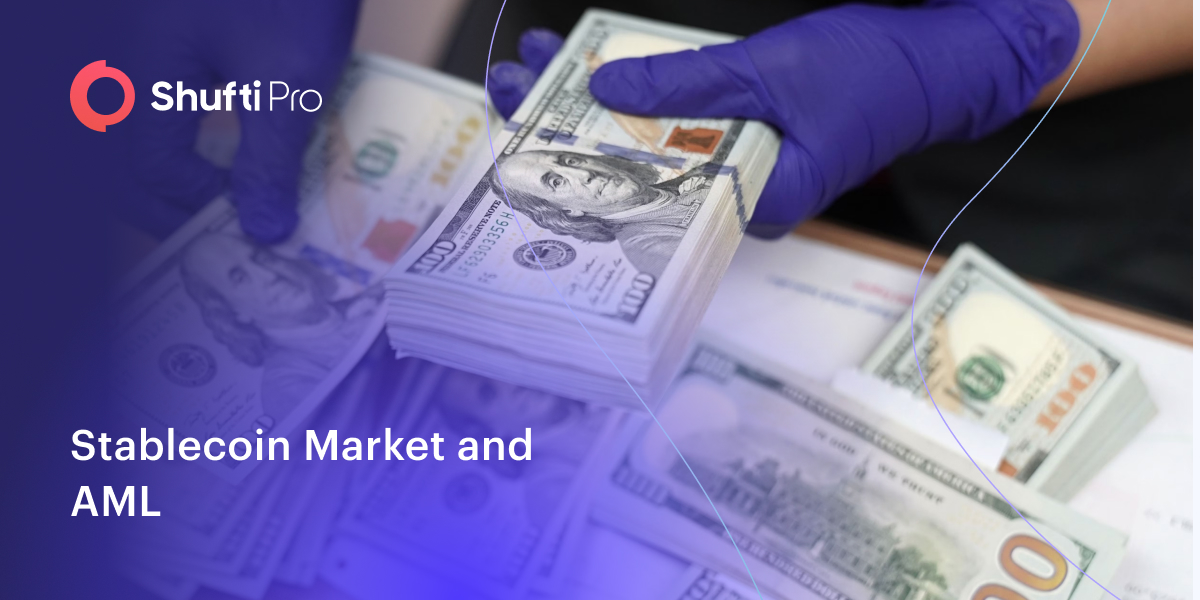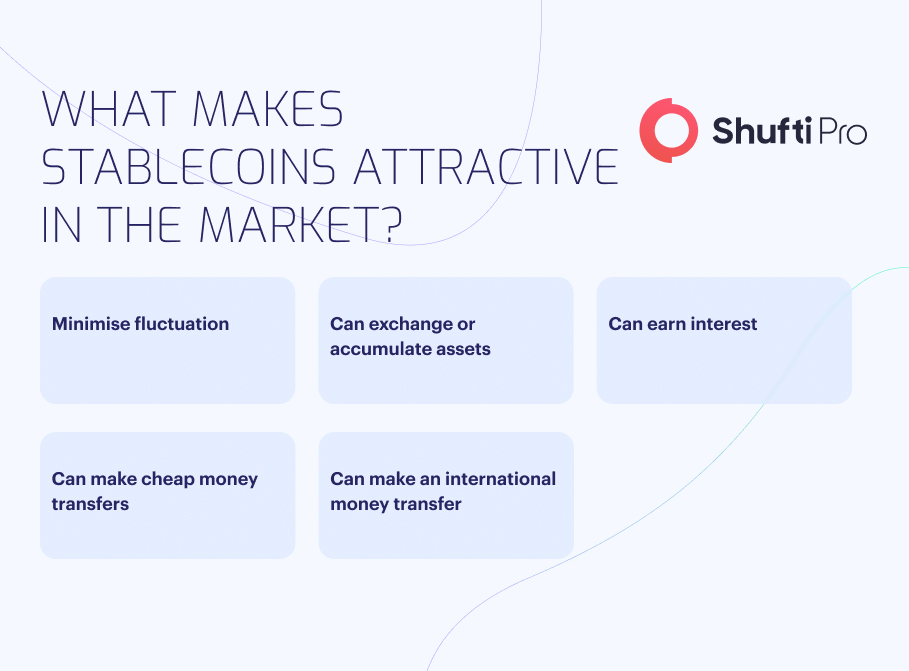Stablecoin Market and the Role of AML in Safeguarding Digital Finance

With the rapid expansion of the cryptocurrency market, stablecoins have swiftly emerged as a popular digital asset class. Stablecoins, intended to reduce price volatility by securing themselves as reliable assets, offer a chance of greater adoption and integration into the larger financial ecosystem. Thus, it is impractical to overestimate the significance of Anti-money Laundering (AML) measures, particularly as the stablecoin market grows.
Understanding the Stablecoin Market
A stablecoin is a digital asset whose value doesn’t fluctuate with respect to an externally pegged conventional asset class. This fundamental asset could be a metal, such as gold, or a fiat currency, like the US dollar. Stablecoins have advantages over other cryptocurrencies, including less price volatility, quicker transaction settlements, and higher liquidity.
The stablecoins market has expanded significantly in recent years, and both the crypto and conventional banking industries have adopted them significantly. Stablecoins’ potential as a means of exchange, a store of wealth, and a link between centralised and decentralised financial systems make them appealing to investors. Stablecoins make Decentralised Finance (DeFi) apps, money transfers, and cross-border transactions more effective.

Stablecoin Regulations in the US
Stablecoins have grown to be a substantial component of the cryptocurrency ecosystem. The expansion of the sector and the concerns over its stability and failure are demanding stringent regulations. In April 2022, US Treasury Secretary, Janet Yellen, highlighted concerns about stablecoin issuers’ capacity to protect their tokens with conventional assets under pressure. Thus, US President Joe Biden issued an executive order in March 2022 ordering government organisations to create a regulatory framework for virtual currencies to safeguard investors and counter any risks.
Wyoming has emerged as the most crypto-friendly US state due to the numerous policies it has put in place to support the digital asset sector. They have laid the legal basis for intelligent contracts, clarified how digital assets are treated under business law, and made it easier to create limited liability firms to benefit investors. Additionally, Wyoming passed legislation enabling banks to keep digital assets without obstructing corporate investors’ direct ownership and granting Decentralised Autonomous Organisations (DAOs) legal status.
The New York Department of Financial Services (NYDFS) published digital currency laws in 2015, enabling organisations to apply for licences for operating digital currency businesses in the state. Due to its tightly controlled digital currency exchanges, New York has emerged as a centre for innovative technology in the blockchain and cryptocurrency industries.
States like California, Texas, Colorado, and Ohio have taken a pro-crypto stance by enacting laws to safeguard consumers, crypto mining, and crypto businesses.
A US House Financial Services Committee member, Josh Gottheimer, introduced the “Stablecoin Innovation and Protection Act”, which aims to safeguard stablecoin holders by identifying eligible stablecoins produced by insured deposit entities and specific non-banking companies. The legislation calls for the setting up a stable-money insurance fund and the option to convert certain stablecoins into US dollars. However, the legislation does not mention how stablecoins could be incorporated into the legal system or reach the larger market.
All cryptocurrency products are intended to be governed under the Responsible Financial Innovation Act (RFIA). If passed, the measure could treat stablecoins like other assets because it addresses investor protection concerns and classifies them as “utility assets.”
The UK Focuses on Stablecoins
The UK’s Financial Conduct Authority (FCA) emphasised the quick rise of virtual currency and assets. It classified the industry as one with a high level of risk, and in January 2022, it enacted tighter regulations. After that, it collaborated with national governments to develop a crypto asset guide that included information on the repercussions of the Russian-Ukrainian War.
Since these assets pose a significant enterprise risk, the government has always focused on safeguarding their firms. However, plans for stablecoins and crypto assets have changed lately as the UK aims to be a hub for these financial assets.
The UK is now expanding its range of digital currency and working hard to take the lead in the market for payment firms. It has adapted its legal framework to recent technology advancements over the past five years, particularly in Virtual Assets (VAs). The government acknowledged stablecoins as a cutting-edge payment method and requested that businesses that accept digital payments expand their investments and offer services in the UK. But whether other economies are prepared to react economically or legally to these changes arises.
Although there is no definitive stablecoin listing in the UK, it constitutes one of the most current payment options in the country. Although the government initially seeks to develop specific regulatory measures, the mediators and investors hope to see certain types on the list.
The Role of AML in the Stablecoin Market
Stablecoins, like any digital asset, are subject to exploitation for illegal purposes like money laundering and other financial crimes. AML measures encounter unique challenges given cryptocurrencies’ anonymity and global reach.
Here are several ways why AML is essential to maintaining the credibility of the stablecoin market:
- Customer Due Diligence (CDD): Stablecoin providers are required by AML legislation to go through extensive client identification and verification procedures. CDD measures entail gathering client data, doing risk analyses, and confirming the source of funds. This ensures that legal requirements are met and contributes to avoiding the anonymous or fraudulent usage of stablecoins.
- Transaction Monitoring: Stablecoin service providers must establish reliable transaction monitoring systems to comply with AML regulations. Transaction monitoring allows for uncovering suspicious activity, including more significant transactions, frequent transfers, or money laundering-related patterns.
- Enhanced Due Diligence (EDD): Stablecoin issuers and service providers should conduct EDD for high-risk transactions. This entails performing additional checks on clients, confirming the actual beneficial owners, and analysing the reason for and nature of the transactions. EDD assists in identifying and reducing the risks related to the improper usage of stablecoins.
- Regulatory Compliance: Stablecoin markets must abide by AML legislation and fulfil reporting requirements, which may include submitting SARs when needed. Compliance with regulations encourages openness, responsibility, and collaboration with law enforcement in the battle against financial crimes.
How Can Shufti Help?
Shufti offers an AI-powered AML solution that screens your clients against 1700+ watchlists and helps the stablecoin market abide by regulations.
Here’s why Shufti’s AML screening solution is every business’s go-to option:
- Interactive user interface
- Screening within seconds
- Enhanced data security
- Fully automated monitoring
Want to know more about how an AML screening solution work?

 Explore Now
Explore Now













